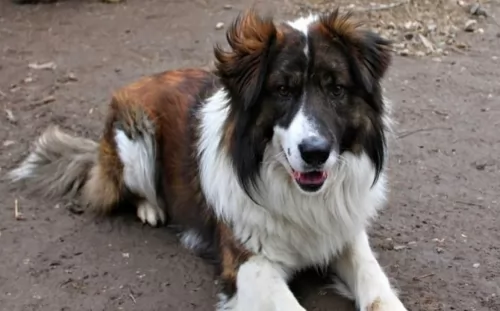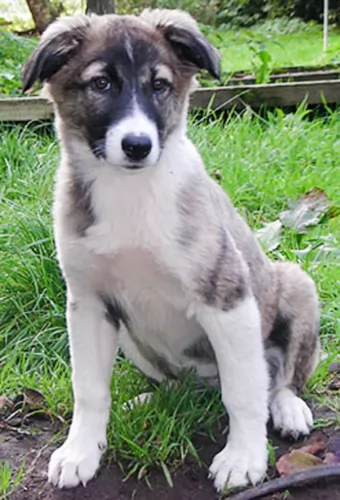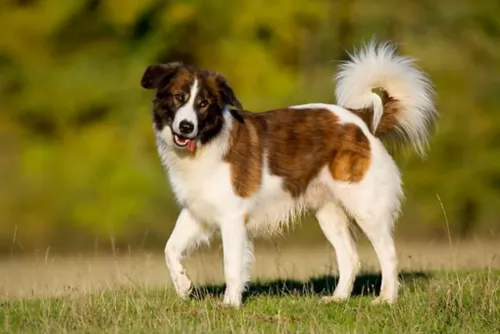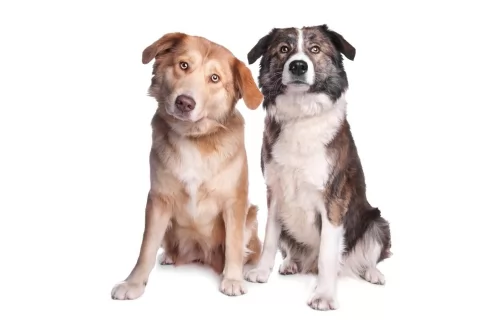 Petzlover
Petzlover Aidi is originated from Morocco but Standard Schnauzer is originated from Germany. Aidi may grow 10 cm / 4 inches higher than Standard Schnauzer. Both Aidi and Standard Schnauzer are having almost same weight. Aidi may live 4 years less than Standard Schnauzer. Aidi may have less litter size than Standard Schnauzer. Aidi requires Low Maintenance. But Standard Schnauzer requires High Maintenance
Aidi is originated from Morocco but Standard Schnauzer is originated from Germany. Aidi may grow 10 cm / 4 inches higher than Standard Schnauzer. Both Aidi and Standard Schnauzer are having almost same weight. Aidi may live 4 years less than Standard Schnauzer. Aidi may have less litter size than Standard Schnauzer. Aidi requires Low Maintenance. But Standard Schnauzer requires High Maintenance
 Aidi dog is also known as Berber dog. It originates from Marocco, where it has been kept to protect people from wild animals, strangers, and predators. It is considered that this breed has been utilized by the Barber tribe that is why it has a name Barber dog. Aidi has recently been protected by a club to keep its purity of the breed.
Aidi dog is also known as Berber dog. It originates from Marocco, where it has been kept to protect people from wild animals, strangers, and predators. It is considered that this breed has been utilized by the Barber tribe that is why it has a name Barber dog. Aidi has recently been protected by a club to keep its purity of the breed.
 Coming out of Germany in the 14th and 15th century is the Standard Schnauzer or Mittelschnauzer. Both the Giant Schnauzer and Miniature Schnauzer are descendants of the Standard Schnauzer. The first name for this breed was the Wire-haired Pinscher until 1879. The breed is a working breed that is popular in Europe and was first in a dog show in 1879 in Hanover, Germany. In 1997 they won Best in Show at the Westminster Kennel Club in New York.
Coming out of Germany in the 14th and 15th century is the Standard Schnauzer or Mittelschnauzer. Both the Giant Schnauzer and Miniature Schnauzer are descendants of the Standard Schnauzer. The first name for this breed was the Wire-haired Pinscher until 1879. The breed is a working breed that is popular in Europe and was first in a dog show in 1879 in Hanover, Germany. In 1997 they won Best in Show at the Westminster Kennel Club in New York.
These medium size Schnauzers were bred in the Middle Ages to be versatile in working and herding in Germany. There seems to be artwork from the 14th through the 16th centuries featuring this breed of dog as a hunter. It is believed that the common ancestors of the Standard Schnauzer is the German Pinscher and the gray Wolf Spitz, along with the black German Poodle and the Bolognese.
It was 1850 when the breed gained recognition as a purebred with distinct and recognizable features. Those are not all the same features that the dogs of today show. These dogs had thick hair on their face, a double coat that is wiry, and their tails were cropped. These dogs were initially Wire-haired German Pinscher then in 1879, a dog named Schnauzer won Best in Show in Hanover. By 1900, the breed was being called Schnauzer everywhere.
The first breed standard was written under the Wire-haired German Pinscher name in the early 1880’s. This standard allowed for a lot of different colors, but the salt and pepper of today was not introduced until the late 1800’s. Then the standard was rewritten in 1907 for the Standard Schnauzer with this as the dominant color.
The first official Standard Schnauzer imported to the United States came in 1905 even though there is a claim that one competed in the 1899 Westminster Kennel Club in the Miscellaneous Class. Following the first World War, the breed became increasingly popular in the States. At that time the US club was called the Wire-haired Pinscher Club of America in 1925. Both standard and miniature sized schnauzer are included in this club.
The breeds were separated in 1933 and became the Standard Schnauzer Club of America and classified by the American Kennel Club as part of the Working Group. In 1926 they moved the Standard Schnauzer to the Terrier Group. By 1926 the Schnauzer Club of Great Britain was formed.
 Aidi dog originate country is Morocco.
A weight of the Aidi dog is 23-25kg while the height is 53-61cm. Female dogs are a little smaller than average males.
Lifespan variates from 10-12 years, but it depends on every individual.
Litter Size of Aidi is 5-8 puppies.
Other Names for Aïdi are Atlas Mountain Dog, Atlas Shepherd Dog, Berber Dog, Chien de l'Atlas, Chien de Montagne de l'Atlas, Kabyle Dog.
Aidi dog originate country is Morocco.
A weight of the Aidi dog is 23-25kg while the height is 53-61cm. Female dogs are a little smaller than average males.
Lifespan variates from 10-12 years, but it depends on every individual.
Litter Size of Aidi is 5-8 puppies.
Other Names for Aïdi are Atlas Mountain Dog, Atlas Shepherd Dog, Berber Dog, Chien de l'Atlas, Chien de Montagne de l'Atlas, Kabyle Dog.
 Today’s Standard Schnauzer is a square, robust, medium sized dog. The breed boasts heavy eyebrows and thick beards. They are salt and pepper or black and their coat is wiry and stiff. The breed have excellent muscle tone and a body in proportion height to length. Their build is rugged, and coat is dense.
Today’s Standard Schnauzer is a square, robust, medium sized dog. The breed boasts heavy eyebrows and thick beards. They are salt and pepper or black and their coat is wiry and stiff. The breed have excellent muscle tone and a body in proportion height to length. Their build is rugged, and coat is dense.
 Aidi is an active dog who loves spending time outside in large space. They are not recommended for people who live in the apartments. They are very protective dogs, so they will be a perfect guard dog for large houses.
Aidi is an active dog who loves spending time outside in large space. They are not recommended for people who live in the apartments. They are very protective dogs, so they will be a perfect guard dog for large houses.
They are amazing with children. Aidi is a very gentle to small kids, and they tend to bond very quickly. It is very important to socialize them on time because they tend to be aggressive towards other animals and people if not properly trained. The best way to socialize them is to spend time with other pets since the early age.
Training of the Aidi might be tricky because it requires constancy and patience. It is also very important to be a firm but without any aggression towards a dog. Awarding and positive training is a must with this breed.
One of the most important things is that Aidi needs to spend a lot of time being active. They need a lot of space to be comfortable even though they do not need a lot of running.
They are very smart dogs who come from a history of guarding dogs, so proper socialization is a must. Aidi is not recommendable for the first time owners. They need a lot of practice and training to be a perfectly good pet.
 There are a couple of major hereditary health issues faced by the Standard Schnauzer.
There are a couple of major hereditary health issues faced by the Standard Schnauzer.
 Feeding Aidi dog depends on the activity and size of each individual. Overall, for a medium-sized dog with average activity 2-2.5 cups of high-quality food would be enough, but if your dog is a very active dog, you should give him extra food. They love eating, so giving your dog healthy fruit and vegetables would be a very nice treat and addition to dry food. Olive oil is also very good for your dog’s coat and digestive system.
Feeding Aidi dog depends on the activity and size of each individual. Overall, for a medium-sized dog with average activity 2-2.5 cups of high-quality food would be enough, but if your dog is a very active dog, you should give him extra food. They love eating, so giving your dog healthy fruit and vegetables would be a very nice treat and addition to dry food. Olive oil is also very good for your dog’s coat and digestive system.
Puppies need to have more meals per day, so dividing 3-4 cups of food into 3-5 meals per day should be a good amount of food for your puppy. Also, regular intake of vitamins and minerals would do a lot of benefits for the health of your dog.
Aida is a very easy dog for grooming. They have a coat that really needs a little extra attention. Few brushing on a monthly basis with an occasional bathing couple of times a year would be enough to have a perfectly groomed dog. They don’t shed a lot, so little extra brushing during the shed period is all you need.
 1Feeding the puppy: At 8-12 weeks feed four times a day. At 3 to 6 months feed three times a day. At 6 to 12 months feed twice a day.
1Feeding the puppy: At 8-12 weeks feed four times a day. At 3 to 6 months feed three times a day. At 6 to 12 months feed twice a day.
4. Games and Exercises – The breed is extremely athletic and needs daily exercise. They are playful with dogs and people and they are family dogs. They want to go wherever you go. Hiking, running, jogging and organized activities.
They are great at obedience, agility, flyball, disc dog, herding and tracking. They have also been involved in search and rescue, bomb detection, and cancer detection.